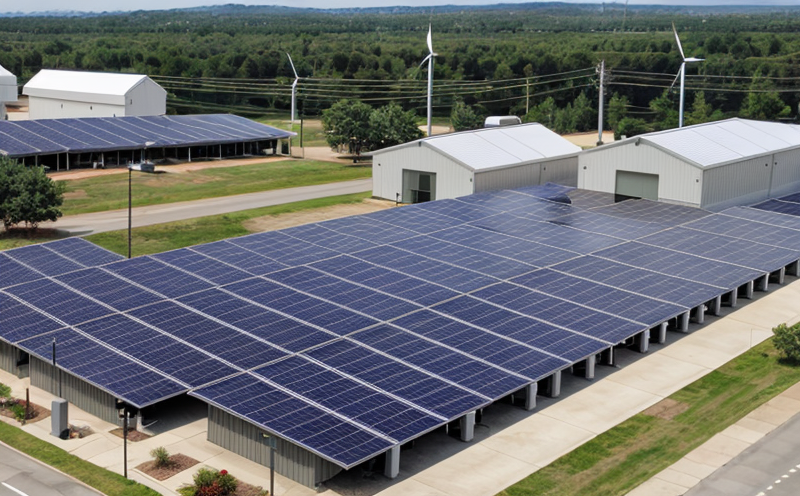EN ISO 12100 Functional Safety Testing in Distributed Energy Systems
The European Union's EN ISO 12100 standard provides a framework for functional safety of machinery. This includes the design, construction, installation, commissioning and maintenance of distributed energy systems (DES). These systems are critical components within microgrids that ensure reliable power supply to both grid-connected and off-grid locations.
The testing procedures outlined in EN ISO 12100 aim at identifying potential hazards associated with machinery during normal operation and fault conditions. This ensures that all DES components meet the necessary safety criteria, reducing risks to personnel, equipment integrity, and operational continuity.
Microgrids represent a growing trend within the energy sector due to their ability to integrate renewable resources while maintaining grid stability. Distributed Energy Systems encompass various technologies including solar photovoltaic (PV) systems, wind turbines, fuel cells, battery storage units, and combined heat and power plants. These components must function safely under all operating conditions.
Our laboratory adheres strictly to EN ISO 12100 guidelines when performing functional safety tests on DES elements. This involves rigorous analysis of potential failure modes using risk assessment methodologies such as Failure Modes and Effects Analysis (FMEA) and Fault Tree Analysis (FTA). Our team employs state-of-the-art simulation tools and hardware-in-the-loop testing setups to accurately model real-world scenarios.
For instance, we conduct comprehensive tests on inverters used in PV installations. These tests verify that the devices can safely disconnect from the grid during faults without causing further harm to personnel or property. Similarly, our experts evaluate battery management systems for their ability to prevent thermal runaway incidents which could lead to catastrophic failure.
The testing process includes detailed analysis of control algorithms implemented within DES components. We ensure these algorithms comply with safety integrity levels (SIL) specified by EN ISO 12100. Compliance is verified through extensive simulations and live tests under various fault conditions.
Our laboratory also focuses on system integration aspects, ensuring seamless coordination between different DES elements within a microgrid environment. This includes validating communication protocols used for data exchange among components as well as verifying emergency shutdown procedures in case of critical failures.
To summarize, our EN ISO 12100 functional safety testing service provides assurance that all DES components meet stringent safety requirements set forth by European standards. By adhering to these guidelines, we contribute towards creating safer and more reliable microgrids capable of supporting increasing levels of renewable energy penetration into the global power supply mix.
Applied Standards
The primary standard employed in our testing is EN ISO 12100:2015, which specifies general principles for functional safety of machinery. This includes requirements related to design, construction, installation, commissioning and maintenance practices that ensure the safety of personnel involved with or exposed to machinery.
For distributed energy systems specifically, relevant standards include:
- IEC 62443-4: Security for Industrial Automation and Control Systems
- IEEE Std 1547-2018: Standard for Interconnecting Distributed Resources with Electric Power Systems
- ASTM G99: Practice for Designing, Constructing, Installing, Operating, and Maintaining Photovoltaic (PV) Systems
These standards provide additional context on how different aspects of DES should be addressed to ensure overall system safety. Our team ensures that all tests conducted align with these standards while also adhering strictly to EN ISO 12100.
Eurolab Advantages
Our laboratory offers several unique advantages when it comes to performing EN ISO 12100 functional safety testing on distributed energy systems:
- Comprehensive Testing Capabilities: We possess advanced test facilities capable of simulating a wide range of operating and fault conditions, ensuring thorough evaluation of all DES components.
- Expertise in Microgrids: Our team has extensive experience working with microgrid projects across Europe. This allows us to provide tailored solutions that address specific challenges faced by this sector.
- Up-to-Date Knowledge: We stay abreast of the latest developments in both standardization and technology, ensuring our testing methodologies remain current and relevant.
- Collaborative Approach: We work closely with clients throughout the testing process, providing regular updates and feedback to help ensure successful outcomes.
- Regulatory Compliance: By adhering strictly to EN ISO 12100 and other applicable standards, we guarantee that all tests meet regulatory requirements necessary for market entry or certification purposes.
- Cost-Effective Solutions: Our comprehensive approach not only ensures compliance but also helps identify potential issues early in the development phase, thereby reducing overall project costs.
These advantages position us as a leader in providing reliable and efficient EN ISO 12100 functional safety testing services for distributed energy systems.
Why Choose This Test
Choosing to undergo EN ISO 12100 functional safety testing offers numerous benefits that are particularly pertinent for companies involved in the development, manufacture or deployment of distributed energy systems:
- Safety Assurance: By ensuring compliance with international standards, you demonstrate a commitment to protecting both personnel and equipment against potential hazards.
- Market Access: Many countries require adherence to these standards for market entry or certification purposes. Ensuring compliance can significantly speed up the approval process.
- Risk Reduction: Early identification of potential risks through rigorous testing helps mitigate costly downtime and repairs later on.
- Innovation Support: Functional safety testing encourages continuous improvement by identifying areas for enhancement based on real-world test results.
- Credibility: Demonstrating compliance with recognized international standards enhances your company's reputation among stakeholders, including customers, investors and regulatory bodies.
- Competitive Edge: In today’s competitive market, demonstrating a robust safety management system can be a key differentiator when competing for contracts or funding opportunities.
In conclusion, choosing EN ISO 12100 functional safety testing is an investment in your company's future success by ensuring it meets the highest international standards of safety and reliability.





